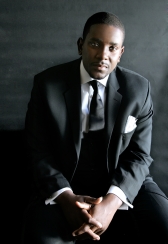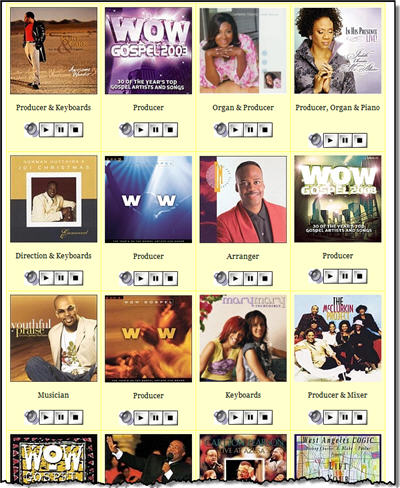Saturday, October 18, 2008
Gospel Lover
TIME is of the essence! Isn't that how we all feel?
Many piano students spend too much TIME learning how to play the piano... years upon years of studying various techniques, music theory, and 'level' after 'level. If you want to start playing ALL of your favorite congregational songs by ear right away, I've definitely found something that's
going to help you do just that.
Over the weekend, my friend Jermaine, the owner of the piano site, HearandPlay.com, was telling me about an idea of his, and it really made A LOT of sense. In fact, our conversation went
so well, he decided to put the information on his website (see below).
http://www.hearandplay.com/437773/gospel101reg.html
Jermaine Griggs,the pioneer of the award-winning
GospelKeys learning concepts, has come up with 3 simple steps so that you won't waste any time at all.
In fact, it'll virtually cut your learning time in half! I copied and pasted the most important parts below so you can get a general idea.
HERE IT GOES...
Step One: Determining the Melody
Step Two: Harmonizing the Melody
Step Three: Adding the Bass
These three steps are not super complicated theories that require several years of experience. In fact, they were designed for the total beginner with absolutely no musical experience.
What most people don't understand is that most songs follow patterns. If you've been mistakenly learning songs, one by one, you're only exercising your ability to MEMORIZE chords --- and that's exactly why it takes SO LONG to learn just one song.
BUT...
If you concentrate on LEARNING PATTERNS, you'll never go wrong because songs are built on repeating patterns. You should NEVER
EVER have to memorize over 100 songs when they all share the same exact CHORDS, PROGRESSIONS, AND PATTERNS.
Click here for more information: http://www.hearandplay.com/437773/gospel101reg.html
(...and if you're really serious about taking your piano playing to the next level, you might want to consider taking them up on their "Secrets to Learning Piano by Ear" 300 pg.
course).
Click here for more information:
http://www.hearandplay.com/437773/course
All the best,
P.S. - You might find more interesting information, techniques, or resources just by clicking around on their website..
Tuesday, October 14, 2008
Musical Keyboards: Defining the melody in the music
Musical instruments have been present in many forms and sizes with the power to make very nice noises. Hence the drums roll in might while the guitars scream in delight and the singers express their emotions but one instrument that plays one of the major parts in the field of music is the keyboard and therefore electronic keyboards are one of the defining elements of the heavenliness associated with music. Perhaps one of the most important tool for any musician, a electronic keyboards are a musical instrument that not only plays the different notes of music but also enriches it by being able to present it in many different forms. Musical instruments have all been fantastic to play as well as hear but keyboards are one of the best devices present for performing the basic task of creating ecstasy with the element of music.
There are many companies which have selected music as their major means of performance in the form of making musical instruments. Hence there is Fender which is involved in making fantastic guitars like the Fender Stratocaster. Adonis drums are considered to be one of the best around and finally when it comes to keyboards the only name that flashes through the brain is Casio. Hence Casio keyboards are one of the best brands that are available and come with many features as well as facets. These keyboards are considered to be the musician's delight and the listener's garb of feel (as these keyboards come with high quality sounds ).
There are many products of these musical keyboards which give the player to experiment with the different sound patterns and hence create magnificent sound patches which revel in their performance. The keyboards that are made under this brand are all very good and hence contain variety of features in the form of key sets and built-in tones for melody as well as percussion. Hence the choice for a good keyboard always falls on the brand Casio.
About the author: The author is a specialist in retail writing. Her writing skills reflect the outcome of years of exposure to the retail industry. Working with retail giants as a consultant has enriched her knowledge base and her passion for writing got fire. She can be read regularly on RetailsDirect.com.musical instruments-Send Diwali Gifts Article Source: http://www.Free-Articles-Zone.com
Sunday, October 12, 2008
Is Your Child Capable of Composing Music? Maybe the next Mozart?
Now there is no doubt that the fact that Mozart was composing music by the age of five does not prove that any of the rest of us ever could compose music, but a number of studies conducted over the past fifty or so years indicates that most children can begin composing music as long as they are given both guidance and opportunity.
True, in the vast majority of the cases the end product is not going to rival anything that Mozart put out, but just because you (or your child) may not be the best there ever was at composing music doesn't mean the attempt is not worth the effort. If we follow that reasoning why would a child learn to walk or run when he or she knows he could never walk or run as well as, say, Michael Jordan? Why would they learn to talk if they knew they could never speak as well as Bill Clinton or Ronald Reagan?
Similarly, imagine if Mozart's parents had not given him the opportunity to be exposed to music and then the formal training that gave him the tools to begin composing music. The world would be a poorer place without the input of this musical genius.
In Mozart's situation, he began formal training on the keyboard at the age of four and within a year he was composing music - though I'm sure that it wasn't of the caliber of his later works. In the case of the average child, however studies have shown that if given the opportunity and the education (i.e. instruction on an instrument, a little bit of music theory, etc) average children can begin composing music somewhere around the age of nine.
Give your child the opportunity and training he or she needs to begin composing music. In most cases it will develop their mind, round out their education, and give them a creative outlet. Eventually, however, of all the children composing music who might not have otherwise, the next Mozart will spring and if it's your child, the world will thank you. And if not, at least your child has been exposed to some good music and had his or her mind stretched a bit.
I am extremely thankful that my parents had the good sense to expose me to music by way of piano lessons starting when I was about
7. And even though it didn't "take" until I was an early teenager, when it did I had the background in music theory and technique to where I could progress rapidly from then on. And while I'm a country mile from Mozart's class, I do well enough to enjoy my self and make a living in music.
Duane Shinn is the author of over 500 music books and music educational materials such as DVD's, CD's, musical games for kids, chord charts, musical software, and piano lesson instructional courses for both children & adults. His book & DVD course entitled "Classical Piano For Adult Beginners!" (http://www.pianoforbeginners.com/) is used by adults around the world. He holds advanced degrees from Southern Oregon University and was the founder of Piano University in Southern Oregon. He is the author of the popular free 101-week online e-mail newsletter titled Amazing Secrets Of Exciting Piano Chords & Sizzling Chord Progressions" (http://www.playpiano.com/) with over 58,800 current subscribers. Classical Piano For Adult Beginners! (www.pianoforbeginners) is used by adults around the world. He is the author of the popular free 101-week online e-mail newsletter titled "Amazing Secrets Of Exciting Piano Chords & Sizzling Chord Progressions" with over 58,800 current subscribers available from www.playpiano.com.
Tuesday, October 7, 2008
Ministry Musician

|
Wednesday, October 1, 2008
Tips To Buy Used Piano From A Piano Store
Moreover, their price range varies too. It becomes very difficult to buy a piano unless one is sure about what he is looking for. It is often suggested that the bigger a piano is, the better would its sound quality be. Also buying the more expensive one, even for a starter, would result in a rich sound experience. But these suggestions do not always hold true. This is the space saving age and it becomes extremely difficult to make space for a huge piano. Moreover, people with limited budget cannot always afford a high level brand new piano. But that does not mean they cannot ever own the musical instrument of their dreams. A lot of piano stores sell used piano.
There are certain advantages of buying a used piano from these piano stores. Firstly, one can get the instrument of his choice at a much cheaper price than a brand new one. Since the depreciation of a piano is very less and one instrument is generally expected to last for almost forty to fifty years, a piano which is ten years old would still be in a good condition, enough to get along well for another thirty years at least. Used piano does not generally come with a warranty.
This makes it important for a buyer to carefully choose the instrument. Certain things must be kept in mind while buying a used piano. It is always better to buy used piano from a piano store rather than buying it from an online shop. Piano is an instrument that needs to be touched, heard and felt before buying. It becomes all the more necessary for used ones in order to carefully check the condition the piano is in. Plenty of piano stores sell used piano these days and it is better to check them out before actually buying one. It is very important to do a history check of the used piano the buyer intends to buy. This should ideally include details about the previous owner if it’s available, how long the piano was with its past owner and how long it has been on the store. If possible it is also wise to find out why the previous owner sold the piano.
If the buyer is new to the instrument it is always better to take along someone who has played a piano for some time and has a considerable experience and understanding of the instrument while buying. They can help assess whether the instrument is in good condition by playing it, listening to how it sounds and how it feels while they're playing it. A price comparison between the used one and other used pianos as well as the same model in brand new condition is also suggested. This would ensure that price to be paid for the used piano is worth. If these factors can be kept in mind and followed carefully while visiting a piano store, a buyer can surely get the best deal when it comes to buying a used piano.
Source: Free Articles


















